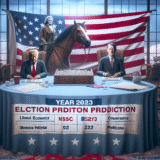Canadian Election 2023: Prediction Markets Favor Liberal Mark Carney Over Conservative Pierre Poilievre
As Canadians prepare to cast their votes in the highly anticipated 45th federal election, political bettors are keenly watching the odds on platforms like Polymarket. The latest predictions indicate a significant lead for the Liberal Party’s Mark Carney, who is projected to have a 78% chance of becoming the next Prime Minister, while the Conservative Party’s Pierre Poilievre trails with a 22% chance. This article delves into the insights from prediction markets, polling data, and the broader implications for Canadian politics and cryptocurrency.
The Landscape of Prediction Markets in Canada
Prediction markets have become a popular avenue for bettors looking to capitalize on political outcomes. Platforms such as Polymarket and Myriad Markets offer users the ability to wager on various scenarios, including election results. As the election date approaches, the market dynamics reveal significant insights into public sentiment. Interestingly, while bettors on Polymarket assign Carney a lower probability of victory compared to some polls, the overall trend remains consistent.
A recent poll aggregator from the public broadcaster CBC suggests Carney’s chances are as high as 89%, reflecting strong support for the Liberal Party. In contrast, FanDuel, a licensed betting platform operating primarily within Ontario, initially indicated a surprising lead for the Conservatives at 70%. However, as the election nears, FanDuel’s odds have adjusted to align more closely with the prediction markets, now estimating an 80% chance for the Liberals.
Understanding the Skepticism Surrounding Prediction Markets
Despite the rising popularity of prediction markets, skepticism remains regarding their reliability. Critics argue that platforms like Polymarket may be susceptible to manipulation, echoing concerns raised during the last U.S. election cycle. Some have suggested that Poilievre’s odds are being artificially suppressed, not accurately reflecting the political climate. However, it’s crucial to note that manipulating these markets can be costly, and there is no credible evidence to support such claims.
In fact, the data from Polymarket Analytics indicates that the Canadian election contract is leading the platform in open interest, which measures the total value of active and unsettled bets. This metric is a strong indicator of market engagement and interest level among bettors.
Who Holds the Power in the Canadian Election Betting Market?
Analyzing the distribution of bets offers further insight into the dynamics at play. The largest position holder betting against Poilievre holds only 6% of the total shares, while the biggest bettor on Carney’s victory commands a 5% stake. This suggests a relatively balanced distribution of money across different outcomes, which may indicate that bettors are placing their bets based on informed analysis rather than mere speculation.
One notable bettor, who has placed a significant six-figure bet on Carney, expressed confidence in the Liberal candidate’s chances. This individual, known as Tenadome, cited the quality of Canadian polling as a key factor in their decision-making. “Poilievre needs a 7-point polling error to win, and I think the probability of that is closer to 7% than his current market price of 23 cents,” Tenadome shared via a direct message on X. “The pool of Poilievre bettors seems to largely be very dumb money that believes in things like China rigging the polls.”
High-Stakes Betting: The Winners and Losers
The stakes in this election are high, and the betting landscape reflects that reality. Currently, the trader with the largest profit on the contract is identified as “ball-sack,” who has accrued a remarkable profit of $124,890 by betting on Carney. In contrast, “biden4prez,” a bettor who wagered against Carney on Poilievre, has faced significant losses, totaling just over $98,000.
As the election approaches, the actions of these traders highlight the financial implications of political betting, where fortunes can be made or lost based on the outcomes of crucial political events.
The Broader Impact of Cryptocurrency on Politics
While the Canadian election currently lacks a significant cryptocurrency angle, the implications of political betting on platforms like Polymarket raise questions about the intersection of politics and digital currencies. Unlike the U.S., where cryptocurrencies often play a role in campaign financing and digital advocacy, Canada’s focus seems to be on traditional issues such as the trade war and inflation. However, as cryptocurrency continues to evolve, its influence on political landscapes worldwide is likely to grow.
For Canadians interested in getting involved in the cryptocurrency market, understanding how to buy popular cryptocurrencies like Bitcoin, Ethereum, and XRP is essential. Various platforms, such as eToro and Kraken, provide comprehensive services for buying and trading digital assets.
Conclusion: What Lies Ahead for Canada?
As the countdown to the election continues, the dynamics of prediction markets suggest a favorable outcome for Mark Carney and the Liberal Party. While skepticism surrounds the reliability of these markets, the data indicates significant engagement and investment from bettors. The outcome of the election will not only shape Canada’s political landscape but could also influence the future role of cryptocurrency in political finance and advocacy.
For those interested in the intersection of politics and cryptocurrencies, monitoring the outcomes of this election and its implications will be crucial. As always, informed betting and investment decisions are critical, and engaging with credible information sources will help navigate the complexities of this evolving landscape.
Stay tuned for further updates and analyses as the Canadian election draws closer and the stakes continue to rise!











